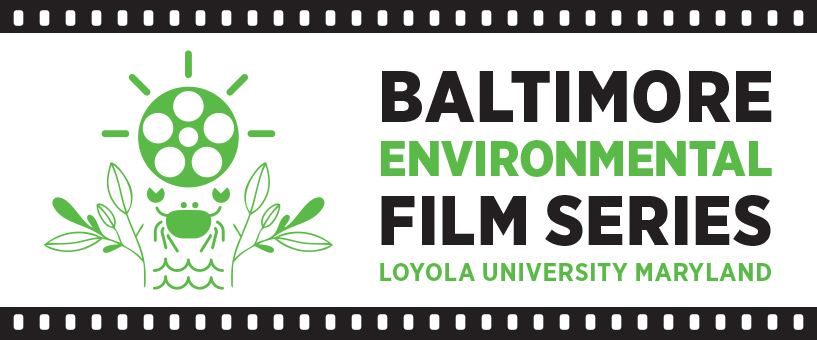
The Baltimore Environmental Film Series at Loyola University Maryland was inspired by the great environmentally themed film festivals in the mid-Atlantic including Environmental Film Fest in the Nation’s Capital and The Environmental Film Fest at Yale. As a Jesuit Catholic Institution environmental sustainability is important to the mission and values of Loyola University Maryland. This film series merges the art of film with education and advocacy for those affected by the major environmental issues of the time. The film series is one of many events publicizing the interdisciplinary minor in Environmental Studies. The series is supported by many programs and offices across campus and supported by funding from the Loyola College Dean's Office & other sources as noted on the events.
The film events are open to the public and free unless otherwise stated. The majority of the events consist of a feature followed by a discussion of the film with the audience. For events on Loyola's campus free parking on campus in the Butler/Hammerman Lot after 4 PM. Street parking is also available along Coldspring Lane and Charles Street after 6 PM. For events in the Loyola Notre Dame Library, parking is available at the library located at 200 Winston Avenue.
The Environmental Film Series is sponsored by Environmental Studies and the Dean of Loyola College.
Spring 2024 Film Series
The Falconer (Kaempfer, 2020)
February 7, 6 PM in Knott Hall B03 (Northeast Corner of Charles Street and Coldspring Lane)
The Falconer is a story of second chances: for injured birds of prey, for an abandoned plot of land, for a group of teenagers who have dropped out of high school, and for Rodney Stotts. This documentary follows master falconer Rodney Stotts on his mission to build a bird sanctuary and provide access to nature for his community. The director weaves Rodney's mission with the story of his past, both of which are deeply rooted in issues of social and environmental injustice, and consistently orient the viewer to his worldview: nature heals.
A Q&A with Rodney Stotts and an educational bird of prey liaison from Rodney's Raptors will be held immediately after the film screening.
This event is presented in collaboration with African & African American Studies and the Karson Institute and sponsored by the Center for Humanities.
Free and open to the public.
Clear Day Thunder: Rescuing the American Chestnut (Murphy & Wood, 2023)
March 20, 6 PM in the Loyola Notre Dame Library Auditorium
This documentary film tells the story of passionate citizen scientists and researchers working to restore this ecologically and economically important species, during this pivotal moment. The tree that forged a connection with humankind has been embraced in turn by humans who, invigorated by hope, are working tirelessly to revive this magnificent tree -- so that it can once again help shape the future.
Following the film, Dr. David Gordon, Philosophy, will lead a Q&A with Bruce Levine, vice president of the Maryland chapter of the American Chestnut Foundation and plant science graduate student at University of Maryland.
Sponsored by the Center for Humanities. Free and open to the public.
The Letter - a message for our Earth (Brown, 2022)
April 11, 6 PM in the Loyola Notre Dame Library Auditorium
The Letter, tells the story of a journey to Rome of frontline leaders to discuss the encyclical letter Laudato Si’ with Pope Francis. The exclusive dialogue with the Pope, included in the film, offers a revealing insight into the personal history of Pope Francis and stories never seen since he became the Bishop of Rome.
Following the film, Dr. Bernadette Roche, Biology, will lead a discussion with the audience about the film.
Sponsored by the Center for Humanities. Free and open to the public.
Fall 2023 Film Series
Upstream, Downriver (Stogner, 2022)
November 15, 6 PM at the Loyola Notre Dame Library Auditorium
Free and open to the public
In this documentary powerful stories of community activists fighting for water justice and equity are interwoven with historical context about the successes and failures of the Clean Water Act. The Act significantly reduced water pollution in America but did not serve many disadvantaged communities. Today, 2.2 million people in the U.S. still live without sewage infrastructure. This documentary takes viewers on a journey of environmental justice and the battle for clean water for everyone.
Flint: Who Can You Trust? (Baxter, 2020)
September 27, 5:30 PM at the Loyola Notre Dame Library Auditorium
Free and open to the public, but registration required. Register at: https://cglink.me/2hL/r2134426
Filmed over 5 years and long after the story was front page news, “Flint: Who Can You Trust?” is full of new twists and turns. Journalist/filmmaker Anthony Baxter goes beyond the headlines in Flint, Michigan, where a government poisoned its own citizens’ water supply, to show the complete breakdown of authority, public trust and faith in the truth itself. “Flint” is a powerful investigation of the breathtaking scope of toxic pseudo-science, celebrity activism, and official negligence. The film reveals the devastating impact on poor people and people of color, which make up the majority of the residents in Flint, as they continue to seek justice and clean water. Featuring Marc Ruffalo and narrated by Alec Baldwin.
This is a Messina common text event